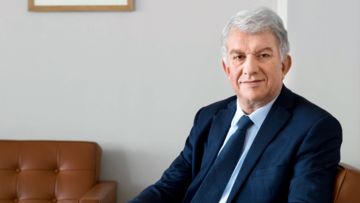
WHY NOW – THE WORLD AROUND US

Inequality: The stark truth and how Amundi targets the root causes
Some Stark Facts[1]:
• The world’s richest 1% have more than twice as much wealth as 6.9 billion people
• Almost half of humanity is living on less than $5.50 a day
• The super-rich avoid as much as 30% of their tax liability
Since the 1980s, inequality has become more and more of a problem, growing to the extreme levels we can see today. The gap between rich and poor – and even the not-so-poor – is creating real social problems, and Covid-19 has only made this more evident.
Recent headlines have shown disproportionately high mortality levels among disadvantaged social groups, as well as huge unemployment numbers whose impact it is still too early to assess.
It is easy to feel powerless as an individual. But there are ways to tackle the issue by putting savings to work in a focused way.
A fund manager with vision and ethical values at its core can use its weight as a corporate shareholder to tackle the underlying root causes of inequality. Amundi, for example, sees fighting inequality as one of its main investment themes.
‘There are different approaches to ESG, but we wanted to take a focused attitude. We have set out clear priorities,’ says Jean-Jacques Barbéris, Director of the Institutional and Corporate Clients division & ESG at Amundi. ‘One is climate change and the environment, while the other is social inequality.’
We have been running a dialogue with companies on the living wage over the past two years, to encourage them to develop comprehensive policies to ensure a minimum base level of benefits for all employees globally and ensure every employee is treated with the same respect
JEAN-JACQUES BARBÉRIS,
Director of the Institutional and Corporate Clients Division & ESG
He notes that the two are linked: ‘‘We know that a transition to a lower-carbon economy will have social impacts. Unless we also address the backdrop of inequality, there will be widespread discontent. The gilets jaunes (yellow vests) movement in France, which was sparked by rising fuel taxes enforced as part of a green initiative, is a good example – and it could be just the start,’ he says. ‘Inequality is a global phenomenon and its effects could be felt even more starkly in the developing world.’[2]
The UN’s 2020 World Social Report[3] endorses this view, citing climate change as one of a number of megatrends – others include international migration, urbanisation, and technological innovation – that will make inequality worse in future unless they are addressed.
Research and resources
One of the most direct ways an asset manager can address the problem is to use its muscle as a shareholder. This can take different forms: most obvious is voting at company AGMs. But Amundi’s approach goes a lot further, Barbéris says.
‘Our voting policy places a strong emphasis on corporate responsibility and governance, but that is not the end of things for us,’ he says.
Amundi is pro-active in engaging with the management of companies it invests in – and even those it doesn’t. ‘We engage in a dialogue with companies where we feel there is room for improvement and try to steer them down the paths they need to take toward concrete action,’ he says.
‘For example, one of the first ways to address inequality is by ensuring that companies pay a living wage to their employees. But in a globalized world there are a lot of factors you need to grasp to truly understand the question – knowledge of supply chains and compliance with national and international labour standards, among others. It’s an area where Amundi’s sizeable resources and “early mover advantage” as a responsible investor are important,’ he says.
“We have been running a dialogue with companies on the living wage over the past two years, to encourage them to develop comprehensive policies to ensure a minimum base level of benefits for all employees globally and ensure every employee is treated with the same respect”.
Share of income earned by the top 1 per cent, 1990 and 2015[4]
Sources:
World Inequality Database. Available from:
https://wid.world/data/.
Notes: Estimates based on pre-tax national income, which is the sum of personal income flows from labour and capital before taxes and all transfers except pensions.
[1]
https://www.oxfam.org/en/5-shocking-facts-about-extreme-global-inequality-and-how-even-it
[2] Amundi as at 30 September 2020
[3] UNDESA World Social Report 2020,
https://www.un.org/development/desa/dspd/world-social-report/2020-2.html
https://www.oxfam.org/en/5-shocking-facts-about-extreme-global-inequality-and-how-even-it
[4] Or earlier/latest year available. The estimates cover only part of the full period in Argentina (1997-2004), Brazil (2001-2015), Colombia (1993-2010), Republic of Korea (1995-2015), Malaysia (1993-2012) and Thailand (2001-2015)
IMPORTANT INFORMATION:
Unless otherwise stated, all information contained in this document is from Amundi Asset Management S.A.S. and is as of 30 September 2020. Diversification does not guarantee a profit or protect against a loss. The views expressed regarding market and economic trends are those of the author and not necessarily Amundi Asset Management S.A.S. and are subject to change at any time based on market and other conditions, and there can be no assurance that countries, markets or sectors will perform as expected. These views should not be relied upon as investment advice, a security recommendation, or as an indication of trading for any Amundi product. This material does not constitute an offer or solicitation to buy or sell any security, fund units or services. Investment involves risks, including market, political, liquidity and currency risks. Past performance is not a guarantee or indicative of future results. All investors should seek professional advice prior to any investment decision, in order to determine the risks associated with the investment and its suitability.
Date of first use: 21 October 2020
Doc ID# 1375571
You might be interested in

A decade of ESG
We sat down with Yves Perrier, Chairman of the Board of Directors at Amundi, to talk about the firm’s decade-long stance on ESG and what the future holds.

Putting responsible investing into practice
The change is part of a much wider shift in society.